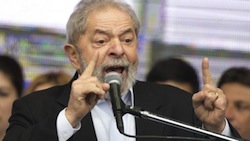Brazil’s former president has been detained for questioning as part of an ongoing inquiry into the Petrobras corruption scandal that is sweeping the country.
Federal Police raided the home of ex-president Luiz Inácio Lula da Silva on March 4, and the former head of state was detained for questioning, reported the BBC. The search warrant served on da Silva’s home was one of the more than 30 being served simultaneously by federal authorities across the country in connection to bribery and money laundering investigations stemming from the wide-ranging Petrobras Scandal. The foundation offices of Da Silva — who is popuarly known in the country as “Lula” — were also raided in São Paulo.
Although detained, the former president was not arrested or charged with a crime, and he has since been released. However, authorities have noted that the investigation is not closed.
Police officials say they have evidence connecting Lula to the Petrobras corruption scheme, alleging that the former president received cash payments and other illicit benefits from the state-owned oil company, Petroleo Brasileiro S. More broadly, the Petrobras probe is concerned with investigating the possible illegal financing of political campaigns and other expenses of the ruling Workers’ Party.
Lula, who served as president from 2003 to 2011, is one of Brazil’s most influential political figures. He is credited with having overseen an economic project that saw both dramatic economic growth and significant decreases in inequality.
InSight Crime Analysis
The slow burn of the Petrobras scandal has embroiled dozens of political and economic elites across Brazil in the high-profile corruption investigation that has spanned two years now. The first arrest connected to the case, of former Petrobras Paulo Roberto Costa, was made in March 2014.
SEE ALSO: Brazil News and Profiles
While several politicians and prominent business figures have been arrested or otherwise implicated in the Petrobras scandal, Lula de Silva is by far the highest-profile political figure to have been implicated to date. This latest development is the closest the investigation has come to the top echelons of power in the Workers’ Party, including current president Dilma Rousseff.
Rousseff has thus far managed to escape any direct implication in the scandal, despite having been the chairwoman of Petrobras from 2003 to 2010, the time period during which investigators say much of the alleged wrongdoing took place. She has denied any involvement. Rousseff immediately succeeded Lula de Silva in 2011 and was narrowly reelected to a second term in 2014.
Worsening economic conditions and rising dissatisfaction with Rousseff’s administration do not bode well for the sitting president, who has weathered multiple calls for impeachment in recent months.
The current dynamic in Brazil in some ways is beginning to mimic events that took place in Guatemala in spring 2015, as the investigation into a customs fraud scheme slowly inched up the political ladder. What began as an investigation into relatively low-level customs officials spread quickly, eventually ensnaring then Vice President Roxana Baldetti and ultimately toppling former President Otto Perez Molina.

